Introduction
What To Feed An Older Cat That Is Losing Weight: As cats age, their nutritional needs can change, and it’s not uncommon for older cats to experience weight loss. There are various factors that could contribute to this weight loss, including a decrease in appetite, changes in metabolism, dental issues, underlying medical conditions, or simply the natural aging process. To address this concern and ensure the well-being of your older cat, it’s important to provide them with a balanced and appropriate diet tailored to their specific needs.
Feeding an older cat that is losing weight requires careful consideration of their nutritional requirements. Here are some key points to keep in mind when determining what to feed your older cat:
Consult Your Veterinarian: Before making any changes to your cat’s diet, it’s essential to consult your veterinarian. They can perform a thorough examination and recommend appropriate dietary adjustments based on your cat’s age, health status, and any underlying medical conditions.
High-Quality Protein: Protein is crucial for maintaining muscle mass in older cats. Look for high-quality protein sources, such as lean meats, poultry, fish, and eggs. These proteins provide essential amino acids that support your cat’s overall health.
Caloric Density: Choose a cat food that is calorie-dense to ensure your cat is receiving enough energy to maintain their weight. Specialized senior cat foods are often formulated with higher energy content to address the reduced caloric intake that can come with aging.
Moisture Content: Older cats cough may have decreased thirst and be prone to dehydration. Wet cat food or incorporating water-rich foods can help increase their moisture intake and support urinary tract health.
Digestibility: Opt for easily digestible foods to prevent any digestive discomfort. This is particularly important for cats with dental issues or sensitive stomachs.

What can I feed my elderly cat to gain weight?
The best diet for bony older cats is high calorie and protein wet food. To find out how much to feed your senior cat, use a BCS. Weigh your cat and use an online calculator to find out how much to feed them.
Understanding the Weight Loss in Elderly Cats
Before diving into how to help your elderly cat gain weight, it’s essential to understand why weight loss occurs in the first place. As cats age, their metabolism tends to slow down, leading to reduced muscle mass and changes in their energy requirements. Additionally, dental problems, kidney disease, hyperthyroidism, and gastrointestinal issues can contribute to decreased appetite and weight loss. Identifying the underlying cause of weight loss is vital for implementing an effective feeding plan.
Consult Your Veterinarian
Before making any changes to your cat’s diet, consult your veterinarian. They can perform a thorough examination, run necessary tests, and determine the underlying cause of your cat’s weight loss. This information will help you develop a tailored feeding strategy that addresses your cat’s specific needs.
Choosing the Right Diet
Your veterinarian might recommend switching your elderly cat to a high-calorie, nutrient-dense diet that supports weight gain. Look for commercial cat foods formulated for senior cats, which often contain higher protein and fat content. Wet food can be especially beneficial due to its higher moisture content, making it easier for cats with dental issues or reduced thirst to stay hydrated.
Supplements and Appetite Stimulants
If your cat’s appetite remains low, your veterinarian might suggest appetite stimulants or nutritional supplements. These can help boost your cat’s interest in food and provide extra calories. However, it’s crucial to use these under veterinary guidance, as inappropriate use can lead to adverse effects.
Why is my elderly cat losing weight but still eating?
When your cat is losing weight but still eating, there might be an underlying medical problem, particularly hyperthyroidism or diabetes. If your cat is losing weight rapidly or is underweight, consult your veterinarian.
Metabolic Changes and Reduced Muscle Mass
As cats age, their metabolism naturally slows down, leading to changes in their energy requirements. This decrease in metabolism can result in reduced muscle mass, contributing to weight loss. Even though your cat may be eating, their body might not be utilizing the nutrients efficiently, causing the weight loss to persist.
Dental Problems
Dental issues can have a significant impact on your cat’s ability to eat comfortably. Painful teeth or gum problems might deter them from consuming their usual amount of food, even if they’re still showing interest in eating. Cats can become selective eaters when they’re experiencing dental discomfort, leading to weight loss over time.
What can I feed my very elderly cat?
The right food for your older cat
While you want to give them something they enjoy, it’s also important that they get the right nutrients for their age. We suggest the Whiskas® 7+ Years range, which comes in delicious fish or meaty flavours, providing everything your cat needs to stay healthy in their senior years.
High-Quality Protein
Protein remains crucial throughout a cat’s life, but it’s especially vital for elderly cats. Opt for high-quality protein sources such as lean meats (chicken, turkey), fish (cooked), and eggs. Adequate protein intake helps maintain muscle mass and supports your cat’s overall health.
Moisture-Rich Diet
Cats tend to drink less water as they age, increasing their susceptibility to dehydration and urinary issues. Feeding your elderly cat wet food, which has higher moisture content, can help ensure they stay hydrated. Additionally, moist food is often gentler on teeth, making it a great choice for cats with dental problems.
Digestibility and Fiber
Select foods that are easily digestible and contain moderate levels of fiber. Fiber helps with digestive health and can aid in managing hairballs, a common concern for older cats with grooming difficulties.
Joint and Bone Health
Look for diets that contain supplements like glucosamine and omega-3 fatty acids, which can support joint health and reduce inflammation. These supplements can be especially beneficial for elderly cats that may be experiencing arthritis or mobility issues.
Balanced Nutrient Content
Ensure your cat’s diet provides a balanced mix of vitamins and minerals. Commercial senior cat foods are often formulated to meet the specific needs of older cats, but consulting your veterinarian is recommended to choose the best option for your pet.
Low Sodium Content
If your cat has any heart or kidney issues, a diet with reduced sodium content can help manage these conditions. Consult your veterinarian for specific dietary recommendations if your cat has pre-existing health concerns.
Small, Frequent Meals
Very elderly cats might benefit from having multiple small meals throughout the day. This can prevent them from becoming overwhelmed by large portions and encourage consistent nutrient intake.
Is it normal for older cats to start losing weight?
As they progress through to 12 and 15 years old, cats lose more lean muscle mass and fat, so they start to look thinner. The exact reasons why are unclear, but keeping your older cat on the same food might play a role.
Metabolic Changes: Cats’ metabolism tends to slow down with age, resulting in decreased muscle mass and potentially reduced appetite. This can lead to gradual weight loss over time.
Reduced Activity: Older cats often become less active as they age. A decrease in physical activity can contribute to a decline in muscle mass and, consequently, weight loss.
Dental Issues: Dental problems become more prevalent in senior cats, affecting their ability to chew and eat comfortably. This can lead to a reduced food intake, causing weight loss even if the cat maintains an interest in eating.
Changes in Taste and Smell: Older cats might experience changes in their sense of taste and smell, which can influence their appetite and food preferences.
Underlying Health Conditions: While some weight loss can be attributed to the natural aging process, it’s important to acknowledge that certain health conditions become more common in older cats. These conditions can exacerbate weight loss or cause it to occur more rapidly.
Can eggs help a cat gain weight?
No more than 10% of your cat’s daily calories should come from treats—including eggs. One large chicken egg has about 75 calories. On average, a 9-lb cat needs about 280 calories per day. Feeding too much egg (or any other treat) can easily lead to unhealthy weight gain.
Benefits of Feeding Eggs to Underweight Cats
Protein-Rich Content: Protein is a fundamental nutrient for muscle development, and eggs provide a readily digestible source of high-quality protein that can aid in weight gain.
Calorie Density: Eggs are calorie-dense, providing a good amount of energy in a relatively small portion. This can be advantageous for cats that need to increase their calorie intake to gain weight.
Nutrient Variety: Eggs offer a spectrum of nutrients that can support your cat’s overall health. The vitamins, minerals, and healthy fats in eggs contribute to their nutritional well-being.
Feeding Eggs to Cats
While eggs can be a valuable addition to a cat’s diet, it’s important to follow certain guidelines to ensure that they are fed safely and in a balanced manner:
Cooked Eggs: It’s recommended to feed cats cooked eggs rather than raw ones. Cooking eggs eliminates the risk of potential bacterial contamination and improves digestibility.
Portion Control: Moderation is key. Too much egg in a cat’s diet can lead to an imbalance of nutrients and potentially cause gastrointestinal upset.
Incorporate Eggs into Meals: Eggs can be scrambled, boiled, or poached, and then mixed into your cat’s regular food. This helps ensure a balanced and varied diet.
Consult Your Veterinarian: Before making any significant changes to your cat’s diet, especially if they are underweight or have health concerns, consult your veterinarian. They can guide you on appropriate portions and ensure that eggs are suitable for your cat’s individual needs.
Does milk help cats gain weight?
Whole, two percent and skim cow’s milk can also add unhealthy amounts of fat to your cat’s diet. According to Purina nutritionist, Karina Carbo-Johnson, MS, “Fats in milk can promote weight gain and cause an upset stomach. Loose stool could indicate a lactose intolerance in your cat.”
The Myth of Milk and Weight Gain
It’s commonly believed that milk can help cats gain weight due to its fat and calorie content. While milk does contain fat and calories, the reality is more complex:
Lactose Intolerance: Many adult cats are lactose intolerant, which means they lack the enzyme needed to properly digest lactose, the sugar found in milk. Feeding milk to lactose-intolerant cats can lead to digestive upset, including diarrhea and gastrointestinal discomfort.
Incomplete Nutrition: Milk is not a balanced or complete source of nutrition for cats. While it might provide calories, it lacks the essential nutrients necessary for a cat’s overall health.
Calorie Density: The fat and calorie content in milk is not as substantial as one might think. Cats need high-quality protein, and while milk does contain some protein, it may not be enough to support healthy weight gain.
Potential Health Risks: Feeding milk to cats can result in digestive disturbances, weight loss due to nutrient imbalances, and even contribute to obesity if given in excess.
A Balanced Diet for Weight Gain
If your goal is to help your cat gain weight in a healthy and effective manner, there are better approaches than relying on milk:
High-Quality Cat Food: Opt for a high-quality, nutritionally balanced cat food that is designed to meet the specific dietary needs of cats. Look for formulations that are higher in calories and protein to support weight gain.
Commercial Cat Treats: Instead of milk, consider offering commercial cat treats that are formulated to provide additional calories and nutrients. These treats are specifically designed to meet cats’ dietary requirements.
Consult Your Veterinarian: If your cat is underweight, consult your veterinarian for guidance. They can recommend a suitable diet plan, conduct necessary health checks, and address any underlying health concerns that might be contributing to the weight loss.
Why is my 17 year old cat losing weight?
Well-recognized causes of weight loss in old cats include chronic renal disease, diabetes mellitus, hyperthyroidism, inflammatory bowel disease (IBD), exocrine pancreatic insufficiency, and dental problems, to name a few.
Natural Aging Process
Weight loss is not uncommon in elderly cats due to various changes that occur as they age:
Metabolic Changes: Older cats experience a gradual decline in their metabolic rate, which can lead to muscle loss and weight loss over time.
Reduced Appetite: Senior cats may have a decreased sense of smell and taste, which can contribute to a diminished appetite and subsequent weight loss.
Dental Issues: Dental problems can hinder a cat’s ability to eat comfortably, leading to a decline in food intake and weight loss.
Underlying Health Conditions: While some weight loss is normal, it can also be a sign of underlying medical issues that become more prevalent in older cats.
Potential Health Concerns
Hyperthyroidism: This condition is characterized by an overactive thyroid gland, which can lead to increased appetite and weight loss. Hyperthyroidism is common in senior cats and can often be managed with medication.
Kidney Disease: Chronic kidney disease can cause weight loss due to reduced appetite, increased thirst, and altered nutrient absorption.
Diabetes: Diabetes can lead to weight loss despite an increased appetite, as the body’s inability to use glucose efficiently causes it to burn fat and muscle for energy.
Cancer: Certain types of cancer can cause weight loss due to changes in metabolism and nutrient utilization.
Gastrointestinal Issues: Conditions like inflammatory bowel disease can affect nutrient absorption, leading to weight loss.
What can I add to my cats food to gain weight?
To help your cat gain weight, you may want to switch to a nutritionally balanced cat food made with at least 30 percent protein and 20 percent fat. A recipe made primarily with meat, poultry, or fish is likely to be appealing and digestible.
Wet Food: Switching your cat to a wet food diet can increase their moisture intake and provide a calorie-dense option. Look for wet foods that are formulated for senior cats or those needing weight gain.
High-Quality Protein: Adding lean protein sources to your cat’s diet can aid in muscle growth. Cooked chicken, turkey, or lean meats are excellent options.
Healthy Fats: Incorporating healthy fats can boost calorie intake. Try adding a small amount of olive oil or fish oil to your cat’s food.
Eggs: Cooked eggs are rich in protein and healthy fats, making them a valuable addition to support weight gain.
Bone Broth: Providing bone broth as an occasional treat can offer added nutrients and encourage hydration.
Commercial Cat Supplements: There are commercial supplements designed to support weight gain in cats. Consult your veterinarian before introducing any supplements to ensure they are appropriate for your cat’s needs.
Kitten Food: While this might not be suitable for all senior cats, kitten food is often higher in calories and can be used under veterinary guidance.
Frequent Meals: Dividing your cat’s daily food intake into smaller, more frequent meals can encourage consistent nutrient intake.
Slow Feeders: Using puzzle feeders or slow feeders can extend mealtime and make eating more engaging for your cat, leading to increased calorie intake.
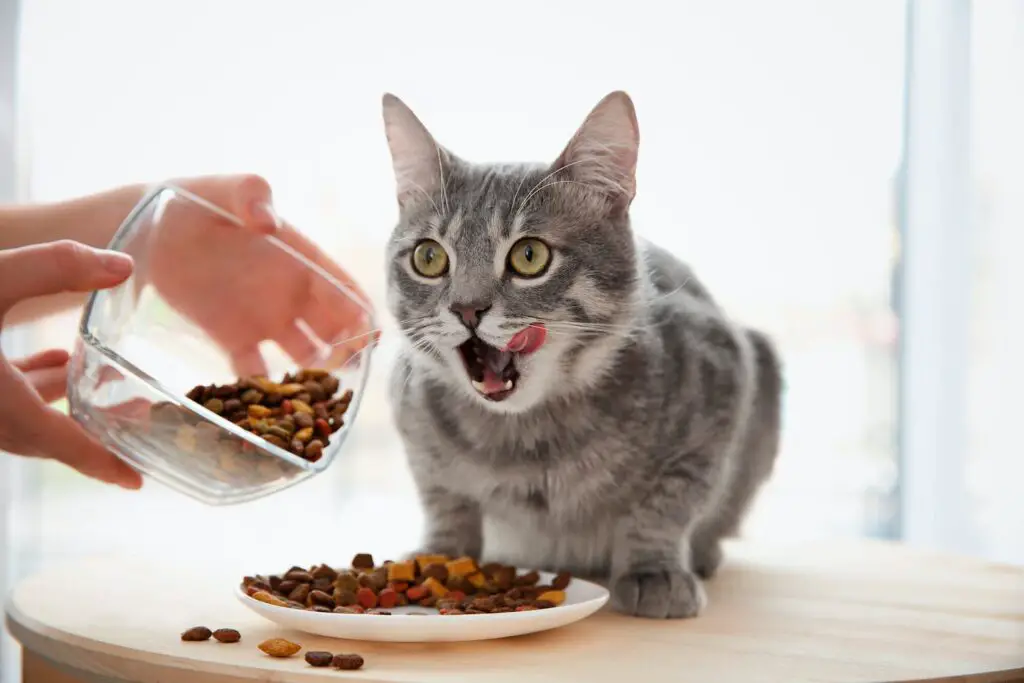
Conclusion
Addressing the weight loss in an older cat requires a thoughtful and informed approach to their diet. As feline companions age, their nutritional needs evolve, making it essential to provide them with the right balance of nutrients to maintain their health and quality of life. Consulting with a veterinarian is paramount in this process, as they can offer personalized guidance based on your cat’s individual needs and any underlying health conditions.
By selecting high-quality protein sources, calorie-dense foods, and options rich in moisture, you can help support your cat’s energy levels, muscle mass, and overall hydration. Omega-3 fatty acids can aid in managing inflammation, while consideration for dental health may involve incorporating softer food options.
Establishing a feeding schedule, monitoring your cat’s appetite and weight, and making gradual dietary adjustments are crucial steps in managing weight loss. Be patient and flexible as you work with your cat to find the most suitable diet for their changing needs.
Ultimately, with the right nutritional support and veterinary guidance, you can help your older cat navigate the challenges of weight loss and promote their well-being in their later years.

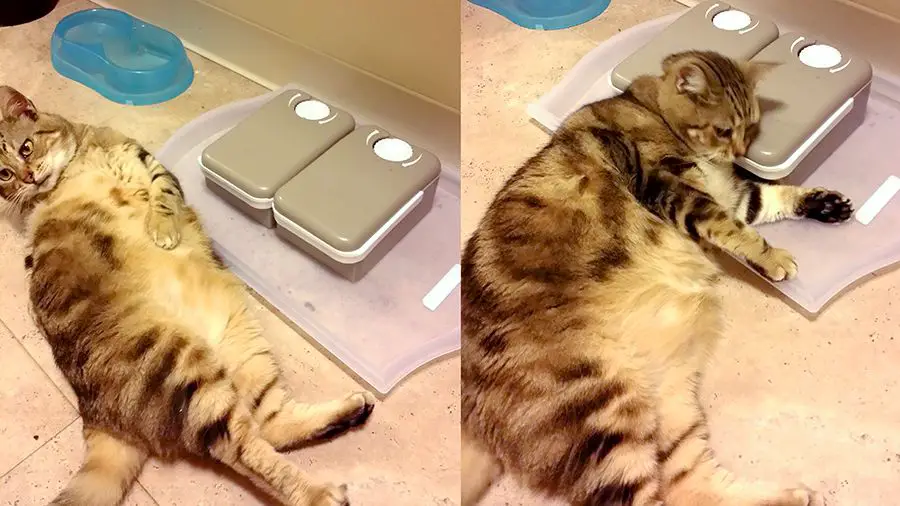
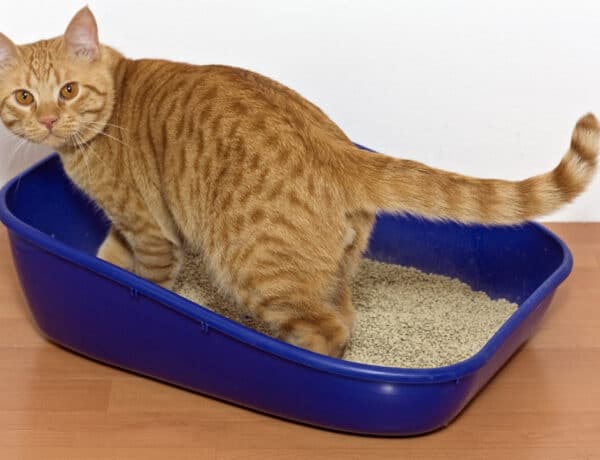
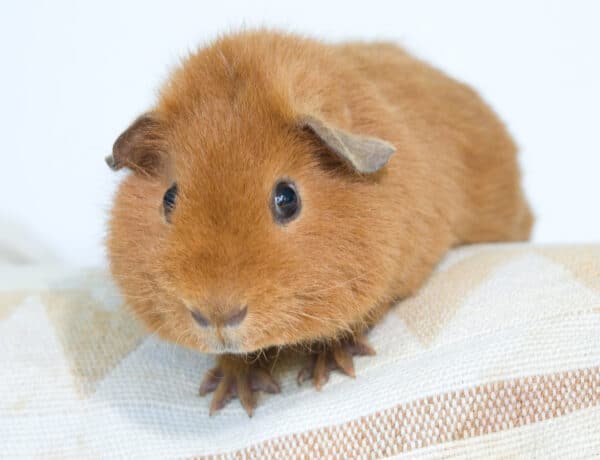
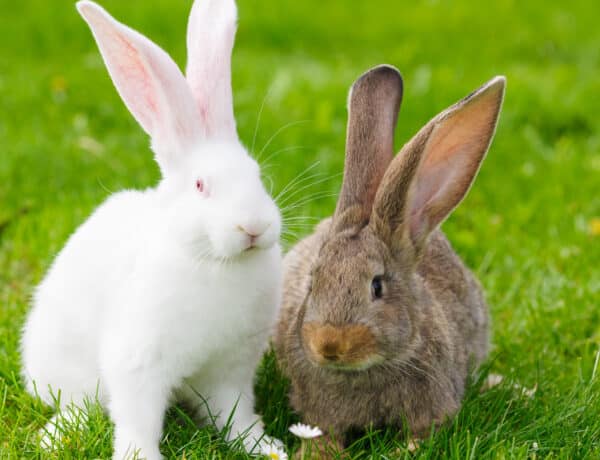
No Comments